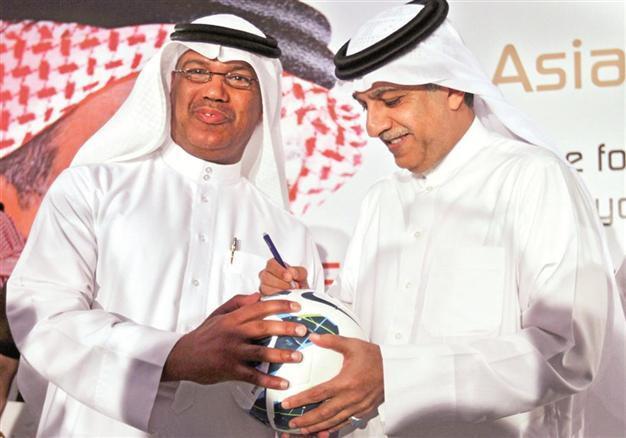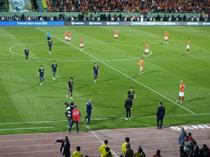Allegations, controversy mar presidential elections at AFC
James M. DORSEY Hürriyet Daily News

Bahrain’s candidate for the Asian Football Confederation Sheik Salman bin Ibrahim Al Khalifa, right, signs a ball for an unidentified man after a press conference in Manama, Bahrain, on April 16. AP photo
Next week’s Asian Football Confederation (AFC) presidential elections - designed to elect a leader to clean up two years of alleged financial mismanagement and unethical business conduct, thus polishing the group’s tarnished image – are being increasingly marred by doubts that real reform is on the horizon, allegations of interference in the poll and controversy over the track records of the candidates.The marring comes against the background of the AFC’s failure, despite efforts by reformers, to project sincerity in achieving transparency and accountability after its president, Qatari national Mohammed Bin Hammam, was banned for life from involvement in football because of unethical conduct in his management of the group’s finances and business affairs. The group has failed so far to follow up on an internal PricewaterhouseCoopers (PwC) report that almost a year ago recommended possible legal action against Bin Hammam and called for a review, if not cancellation, of the AFC’s foremost $1 billion contract to commercialize its rights.
The impression of lack of sincerity is cemented by allegations of political interference and fears of bribery in the campaign of some candidates, a majority of whom are tainted by their past association with Bin Hammam. There are also allegations of past wrongdoing as in the case of Worawi Makdudi of Thailand, which he successfully refuted, and in Sheikh Salman’s failed 2009 election campaign, in which he was defeated by Bin Hammam.
Human rights abuses
Moreover, Sheikh Salman faces assertions that his office failed to denounce alleged abuses of human rights, and also identified athletes, including players for the Bahrain national football team, who were arrested, tortured and charged for their participation in anti-government protests.
The allegations of interference are bolstered by the fact that three of the four candidates – Yousuf al-Serkal of the United Arab Emirates, Sheikh Salman bin Ibrahim al-Khalifa and Hafez al-Medlej of Saudi Arabia – hail from the Middle East. Alliances and active support for the frontrunners, Sheikh Salman and al-Serkal, mirror the political line-up of Gulf states.
Kuwait publicly backs the Bahraini candidate, a reflection of the two countries’ frequent alignment with Saudi Arabia versus the perceived Qatari backing for al-Serkal that groups the two states who often follow a more independent course. Al-Medlej, who has hinted that he may withdraw at the last minute, does not seem to have significant backing, even from his own government.
Sheikh Salman is competing with Qatar’s Hassan al-Thawadi to fill Bin Hammam’s seat on the executive committee of world football body FIFA.
Sources close to the AFC argue that the new president, who will be in office for less than two years to complete the term of Bin Hammam, will have little time for reform. As a result, they say Asian political and football leaders are focused on the 2015 election. “It takes six months to settle into office, six months to consolidate and then he’ll have six months to campaign,” said one source.
It hardly helps the AFC’s image that the public campaign of frontrunner Sheikh Salman has in recent weeks been dominated by defense of his record during the brutal crushing two years ago of a popular uprising in Bahrain.
The allegations of interference in the election center on the endorsement of Sheikh Salman by the Olympic Council of Asia (OCA) headed by former Kuwaiti government minister, Sheikh Ahmad al-Fahad al-Ahmed al-Sabah. Messrs al-Serkal and al-Medlej have denounced the OCA’s support as interference in the election.
The OCA was reported to have offered in Sheikh Salman’s failed 2009 campaign several AFC members financial incentives if they voted for him. News reports said OAC officials have accompanied Sheikh Salman on several of his current campaign stops in Asia.
“Ethical obligations”
Inside World Football disclosed this week a letter sent by AFC general secretary Dato’ Alex Soosay to the group’s 46 member associations asking them to remember their “ethical obligations” when casting their vote. The letter warned against “offering and accepting gifts and benefits; bribery; and conflicts of interests.” Soosay went on to note that “it is the duty and obligation of the Confederation to prevent the introduction of improper methods and practices that might jeopardize the integrity of, or give rise to, the abuse of football.”
Sheikh Salman, a member of the Bahraini royal family, has denounced allegations that his office assisted in the abuse of human rights as a “clear attempt to damage my personal reputation and to interfere with the AFC presidential elections.”
He has stopped short of parroting statements by the government that protesters demanding greater freedom and rights were instigated by Iran, described by a Bahrain expert in the corridors of a recent conference in Manama as “delusional.”
The government this weekend denounced thousands of protesters who exploited the Formula One Grand Prix to showcase their grievances as “terrorists.” Bahrain this week also accused the U.S. State Department of “fuelling terror and terrorists” by charging in a recent report on Bahrain that “the most serious human rights problems included citizens’ inability to change their government peacefully; and arrest and detention of protesters on vague charges, in some cases leading to their torture in detention.”
In a letter this week to AFC members, Americans for Democracy and Human Rights in Bahrain (ADHRB) said that “in the two years since the uprising began, life has been anything but normal for Bahrain’s football players. The actions taken against Bahrain’s football players by the Bahrain Football Association, led by Sheikh al-Khalifa, are hardly credible, are devoid of integrity, and fail to respect the personal rights of the players. As leader of the organization that led such abuses, Sheikh al-Khalifa bears responsibility for what was done to these players.” Bahraini human rights groups have asked FIFA to bar Sheikh Salman from running for office.
















